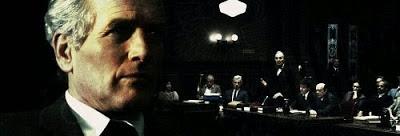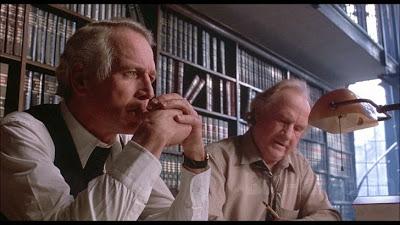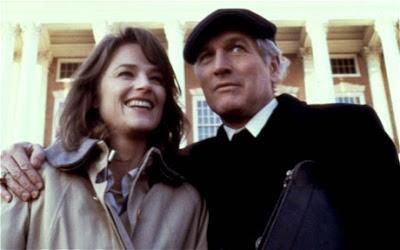
By
Alex Simon
Frank Galvin (Paul Newman) is a man who has given up. A once-promising honors graduate of Boston College Law School, partner in one of the city’s most prestigious firms (not to mention married to the daughter of the firm’s founder), Galvin discovered too late that he had the biggest Achilles Hell an attorney can be cursed with: a conscience. Upon learning that another partner in his firm tried to bribe a juror from a case Frank was trying, thinking he’d be helping Frank out, Frank threatened to report him to have him disbarred and prosecuted. So of course, the firm backed Frank, fired the crooked lawyer and made sure he spent many years making license plates at the state pen, while giving Frank a raise and a key to the city. Right?
Sidney Lumet’s 1982 film The Verdict is one of the great cinematic redemption stories. In it, we catch up with Frank a little more than a decade after he’s lost everything. He’s a broken-down alcoholic who’s had three clients in the past four years, all of whom lost their cases thanks to Frank’s unique brand of lawyering. An unabashed ambulance chaser, his old buddy and former law mentor Mickey (Jack Warden) throws him a medical malpractice case that can’t lose, involving Deborah Ann Kaye, a young woman who was given an anesthetic during childbirth in the city’s most venerable Catholic hospital, after which she choked on her own vomit and was deprived of oxygen. The young woman is now in a coma, on a respirator. Her sister and brother-in-law are hoping for a settlement to properly care for the victim, and to pay for a move to Arizona from Boston. Frank assures them they have a strong case.

Loosely based on the real case of Karen Anne Quinlan in the 1970s, The Verdict was adapted by David Mamet from former trial attorney Barry Reed’s novel, and marked what many feel is the high point of Paul Newman’s already-storied career of iconic performances. Even under the most critical eye, Newman’s work here was never better. We see his Frank Galvin go through a virtual kaleidoscope of human emotions from the opening shot: Galvin playing pinball in the seedy bar he calls his second home with a countenance that suggests slow death, to the final image of him staring at a ringing phone with ambivalence. In fact, even though you enter the theater knowing you’re seeing a Paul Newman picture, everyone’s iconic hero (or anti-hero) since the 1950s, where he almost always comes out on top, even when he’s killed (as in Cool Hand Luke or Butch Cassidy and the Sundance Kid), it doesn’t matter—he and his character have made their marks on everyone they’ve encountered and they, and we, and the world are better for it. Not so in The Verdict.
In fact, almost from the get-go, when you see that Frank’s crumbling office, his flophouse of an apartment, that fact that he is taking on the Archdiocese of Boston, and not to mention the city’s toughest, most legendary lawyer (the great James Mason) who has a phalanx of attorneys at his beck and call, like Roman foot soldiers, you keep saying to yourself “Holy shit, there’s no way this guy can win.” Even when he attempts to cure his hand tremors after the previous night’s bender, and must lean down like an old dog into his shot glass for that sip of medicinal whiskey, Frank Galvin has none of the legendary Paul Newman cool. He’s a husk. A dried out leaf. A cracked, empty shell. Forget about there being a pearl in this oyster, if there ever was one.

Hoping to find redemption in the form of romance, Frank meets the lonely, slightly worn, but still-lovely Laura (Charlotte Rampling) at his local bar one night. She stands out amongst the bloated, burned out drinkers who sit unsteadily the joint’s creaky barstools. Frank and Laura drink together, make weary, slightly ambivalent, but most likely sweet love and seem to hang on to one another like a buoy in a storm. Frank is already counting the money he’ll make from the settlement the Archdiocese is sure to offer, meaning no need for a trial. Then, Frank goes to visit Deborah Ann in the hospital.
Everything changes.
Deborah Ann is curled in a fetal position, hooked up to a series to tubes, respirators and machines. Frank suddenly has absolute clarity and the light comes back into his eyes for the first time. When a nurse tries to shoo him away, Frank answers with authority and strength: “I’m her attorney.” There will be no out of court settlement, even after the Archdiocese offers a cash settlement of $210,000 (a tidy sum in 1982). Frank bristles at this, “I was just thinking how neatly the number three goes into this figure.” Frank turns it down, taking the case, and himself, to trial.
Sidney Lumet stages incredible courtroom sequences in the film, with Milo O’Shea gleefully portraying one of the most loathsome judges in film history, a man you can tell has been bought and paid for, and can’t wait to ditch his robes for golf cleats and a high ball somewhere. As one obstacle after another gets thrown in Frank’s path, he keeps getting up, climbing over them, around them, and through them. Because he just can’t stop. At the film’s darkest moment, when it truly seems all is lost, Mickey gently massages his wounded comrade’s shoulders, reassuring him: “There’ll be other cases.” Frank starts repeating “There are no other cases. This is the case. There are no other cases. This is the case…” It becomes Frank’s mantra for the remainder of the story.
Newman delivers Frank’s closing statement (and the film’s climax) with such simplicity, dignity and controlled power, that it’s not only the finest moment in his career as a film actor, it’s one of the best verbal renditions of a man’s (and man’s) redemption ever written and delivered. Paul Newman received his seventh Academy Award nomination for playing Frank Galvin, with everyone in Hollywood assuming he was a shoo-in, but lost to newcomer Ben Kingsley in the titular role of Gandhi. Newman would go on to receive an honorary Oscar in 1986 and a Best Actor statuette in 1987, for reprising his role of “Fast” Eddie Felson, in Martin Scorsese’s The Color of Money, an ad-hoc sequel to The Hustler.
Frank Galvin’s take on life can be summarized in joke he repeats during The Verdict, usually in the company of his drinking buddies at his local pub. Like all great writing, it says a great deal while seeming to say something else:
“So Pat says, he says, ‘They got this new bar... and you go inside and for half a buck you get a beer, a free lunch and they take you in the back room - they get you laid...’ Mike says, ‘Now wait a minute, wait a minute, wait a minute. Do you mean to say there's a new bar and you go inside and for a half a buck they give you a beer, a free lunch and they take you in the back room and they get you laid?’ Pat says, ‘That's right.’ ‘Have you ever been in the bar?’ And he says, ‘No, but me sister has.’”
Frank Galvin, one of the screen’s greatest, most magnificent bastards.
